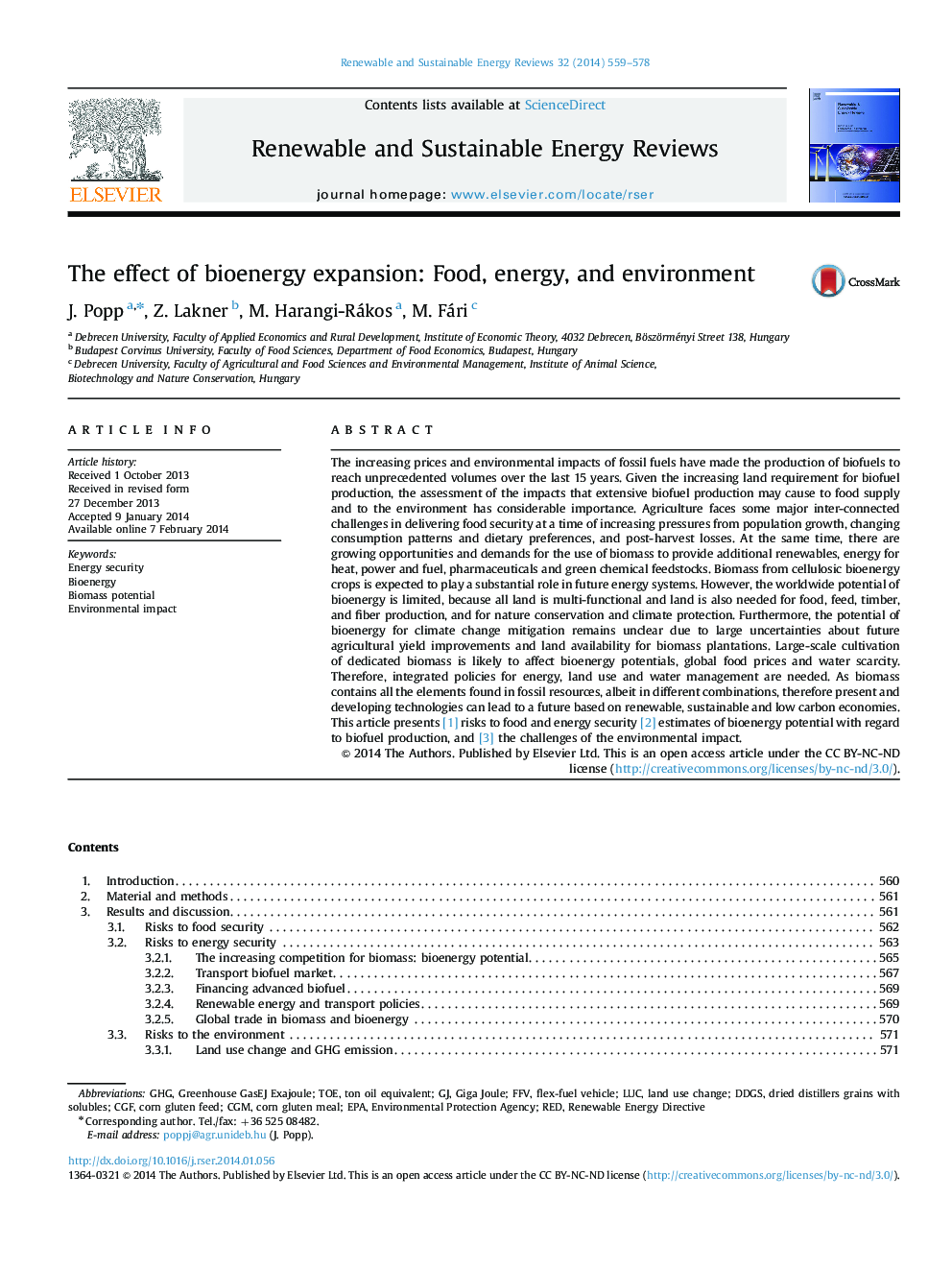| کد مقاله | کد نشریه | سال انتشار | مقاله انگلیسی | نسخه تمام متن |
|---|---|---|---|---|
| 8120344 | 1522353 | 2014 | 20 صفحه PDF | دانلود رایگان |
عنوان انگلیسی مقاله ISI
The effect of bioenergy expansion: Food, energy, and environment
ترجمه فارسی عنوان
تأثیر توسعه زیست انرژی: غذا، انرژی و محیط زیست
دانلود مقاله + سفارش ترجمه
دانلود مقاله ISI انگلیسی
رایگان برای ایرانیان
کلمات کلیدی
DDGSCGFTOEFFVCGMEPALUCGHGEnvironmental Protection Agency - آژانس حفاظت از محیط زیستEnvironmental impact - اثرات زیست محیطیEnergy security - امنیت انرژیCorn gluten feed - تغذیه گلوتن ذرتLand use change - تغییر کاربری زمینDried distillers grains with solubles - دانه های خشک شده با محلول های غلیظRenewable Energy Directive - دستورالعمل انرژی تجدید پذیرBioenergy - زیستانرژیRED - سرخCorn gluten meal - غذا گلوتن ذرتBiomass potential - پتانسیل زیست توده
ترجمه چکیده
افزایش قیمت ها و تاثیرات زیست محیطی سوخت های فسیلی، تولید سوخت های زیستی را در طی 15 سال گذشته به میزان بی سابقه ای افزایش داده است. با توجه به افزایش نیاز زمین برای تولید سوخت زیستی، ارزیابی اثرات تولید سوخت زیستی گسترده که ممکن است باعث تامین مواد غذایی و محیط زیست شود اهمیت زیادی دارد. کشاورزی با مواجه شدن با برخی از چالش های مهم در ارتباط با امنیت غذایی در زمان افزایش فشار از رشد جمعیت، تغییر الگوهای مصرف و تنظیمات رژیم غذایی و تلفات پس از برداشت مواجه است. در عین حال، فرصت ها و نیازهای رو به رشد برای استفاده از زیست توده برای فراهم کردن انرژی اضافی انرژی، انرژی برای گرما، برق و سوخت، داروسازی و مواد شیمیایی سبز وجود دارد. انتظار می رود که زیست توده از محصولات زیست انرژی سلولزی نقش مهمی در سیستم های انرژی آینده ایفا کند. با این حال، پتانسیل جهانی انرژی زیستی محدود است، زیرا تمام زمین چند منظوره است و همچنین زمین برای تولید غذا، خوراک، چوب و فیبر، و همچنین برای حفاظت از طبیعت و حفاظت از آب، مورد نیاز است. علاوه بر این، پتانسیل زیست محیطی برای کاهش تغییرات اقلیمی به علت عدم اطمینان زیادی در مورد بهبود عملکرد کشاورزی در آینده و دسترسی به زمین برای مزارع زیستی هنوز نامشخص است. به طور گسترده ای کشت زیست توده اختصاص یافته به احتمال زیاد بر توانایی های زیست انرژی، قیمت های جهانی مواد غذایی و کمبود آب تاثیر خواهد گذاشت. بنابراین، سیاست های یکپارچه برای انرژی، کاربری زمین و مدیریت آب مورد نیاز است. به عنوان زیست توده شامل تمام عناصر موجود در منابع فسیلی، گرچه در ترکیب های مختلف، بنابراین در حال حاضر و در حال توسعه فن آوری می تواند به آینده مبتنی بر اقتصادهای تجدید پذیر، پایدار و کربن کم منجر شود. این مقاله [1] برآورد پتانسیل های زیست انرژی با توجه به تولید سوخت زیستی [1] و خطرات مربوط به امنیت غذایی و انرژی [3] و [3] چالش های اثرات زیست محیطی را ارائه می دهد.
موضوعات مرتبط
مهندسی و علوم پایه
مهندسی انرژی
انرژی های تجدید پذیر، توسعه پایدار و محیط زیست
چکیده انگلیسی
The increasing prices and environmental impacts of fossil fuels have made the production of biofuels to reach unprecedented volumes over the last 15 years. Given the increasing land requirement for biofuel production, the assessment of the impacts that extensive biofuel production may cause to food supply and to the environment has considerable importance. Agriculture faces some major inter-connected challenges in delivering food security at a time of increasing pressures from population growth, changing consumption patterns and dietary preferences, and post-harvest losses. At the same time, there are growing opportunities and demands for the use of biomass to provide additional renewables, energy for heat, power and fuel, pharmaceuticals and green chemical feedstocks. Biomass from cellulosic bioenergy crops is expected to play a substantial role in future energy systems. However, the worldwide potential of bioenergy is limited, because all land is multi-functional and land is also needed for food, feed, timber, and fiber production, and for nature conservation and climate protection. Furthermore, the potential of bioenergy for climate change mitigation remains unclear due to large uncertainties about future agricultural yield improvements and land availability for biomass plantations. Large-scale cultivation of dedicated biomass is likely to affect bioenergy potentials, global food prices and water scarcity. Therefore, integrated policies for energy, land use and water management are needed. As biomass contains all the elements found in fossil resources, albeit in different combinations, therefore present and developing technologies can lead to a future based on renewable, sustainable and low carbon economies. This article presents [1] risks to food and energy security [2] estimates of bioenergy potential with regard to biofuel production, and [3] the challenges of the environmental impact.
ناشر
Database: Elsevier - ScienceDirect (ساینس دایرکت)
Journal: Renewable and Sustainable Energy Reviews - Volume 32, April 2014, Pages 559-578
Journal: Renewable and Sustainable Energy Reviews - Volume 32, April 2014, Pages 559-578
نویسندگان
J. Popp, Z. Lakner, M. Harangi-Rákos, M. Fári,
